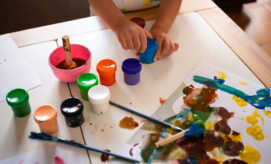The rate and rhythm of our breath reflects our mood and headspace. We know that our breath is rapid when we are stressed, while our breathing becomes slow and steady when we are calm and regulated. And, just as our mood impacts our breath, the opposite is also true! We can adjust our breathing to change our mood.
An article from Mindful.org offers suggestions for teaching children about the power of mindful breathing to control our nervous system– it’s like a superpower! The authors highlight the importance of making mindful breathing fun and engaging so that young children are encouraged to incorporate this practice into their lives. They share the following tips for making mindful breathing exciting for little ones:
- Incorporate Movement. Try the Jurassic Breath by encouraging children to breathe in, hold their arms up like a T-Rex, and then let out a loud roar. They can also stretch out their arm like an excavator arm as they breathe in and then scoop imaginary dirt as they breathe out.
- Encourage Children to Pretend. Children love to utilize their creativity with make believe play. Invite them to pretend that they are pirates, breathing in the salty sea air, and then breathe out with a hearty “ARRRR!!!!”
- Use familiar references. Children have experience controlling their breathing from blowing out candles on a birthday cake, blowing bubbles, or holding their breath while swimming. Use these familiar references to guide mindful breathing exercises. For example, you might encourage children to breathe in, imagine a big birthday cake in front of them, and then blow out the candles…while making a few wishes! Maybe one wish for themselves, one for their friends, and one for the whole world.
Try out some of these tips with the little ones in your care to help them learn fun and important social-emotional skills in self-regulation and control.





